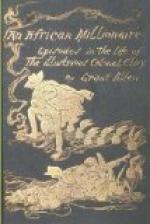“Never mind, Sey,” my brother-in-law said. “I was told in New York that Dr. Frank Beddersley, of London, was the best exponent of the Bertillon system now living in England; and to Beddersley I shall go. Or, rather, I’ll invite him here to lunch to-morrow.”
“Who told you of him?” I inquired. “Not Dr. Quackenboss, I hope; nor yet Mr. Algernon Coleyard?”
Charles paused and reflected. “No, neither of them,” he answered, after a short internal deliberation. “It was that magazine editor chap we met at Wrengold’s.”
“He’s all right,” I said; “or, at least, I think so.”
So we wrote a polite invitation to Dr. Beddersley, who pursued the method professionally, asking him to come and lunch with us at Mayfair at two next day.
Dr. Beddersley came—a dapper little man, with pent-house eyebrows, and keen, small eyes, whom I suspected at sight of being Colonel Clay himself in another of his clever polymorphic embodiments. He was clear and concise. His manner was scientific. He told us at once that though the Bertillon method was of little use till the expert had seen the criminal once, yet if we had consulted him earlier he might probably have saved us some serious disasters. “A man so ingenious as this,” he said, “would no doubt have studied Bertillon’s principles himself, and would take every possible means to prevent recognition by them. Therefore, you might almost disregard the nose, the chin, the moustache, the hair, all of which are capable of such easy alteration. But there remain some features which are more likely to persist—height, shape of head, neck, build, and fingers; the timbre of the voice, the colour of the iris. Even these, again, may be partially disguised or concealed; the way the hair is dressed, the amount of padding, a high collar round the throat, a dark line about the eyelashes, may do more to alter the appearance of a face than you could readily credit.”
“So we know,” I answered.
“The voice, again,” Dr. Beddersley continued. “The voice itself may be most fallacious. The man is no doubt a clever mimic. He could, perhaps, compress or enlarge his larynx. And I judge from what you tell me that he took characters each time which compelled him largely to alter and modify his tone and accent.”
“Yes,” I said. “As the Mexican Seer, he had of course a Spanish intonation. As the little curate, he was a cultivated North-countryman. As David Granton, he spoke gentlemanly Scotch. As Von Lebenstein, naturally, he was a South-German, trying to express himself in French. As Professor Schleiermacher, he was a North-German speaking broken English. As Elihu Quackenboss, he had a fine and pronounced Kentucky flavour. And as the poet, he drawled after the fashion of the clubs, with lingering remnants of a Devonshire ancestry.”
“Quite so,” Dr. Beddersley answered. “That is just what I should expect. Now, the question is, do you know him to be one man, or is he really a gang? Is he a name for a syndicate? Have you any photographs of Colonel Clay himself in any of his disguises?”




